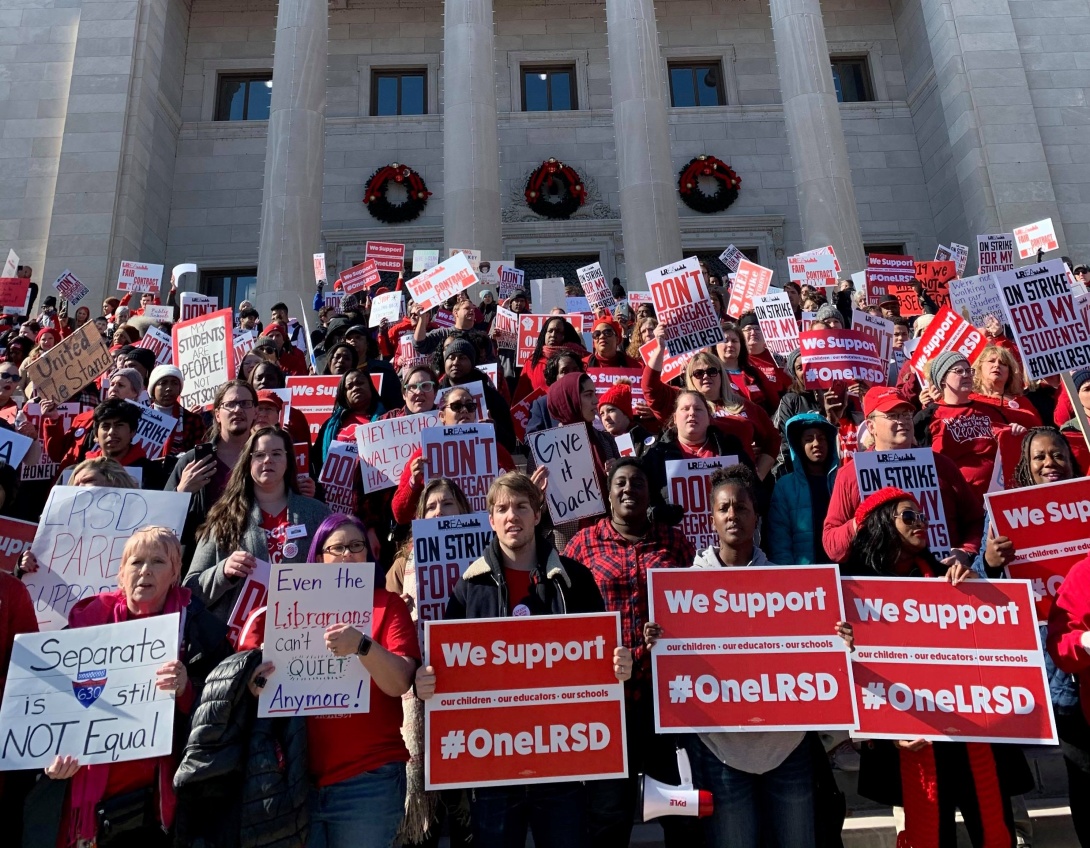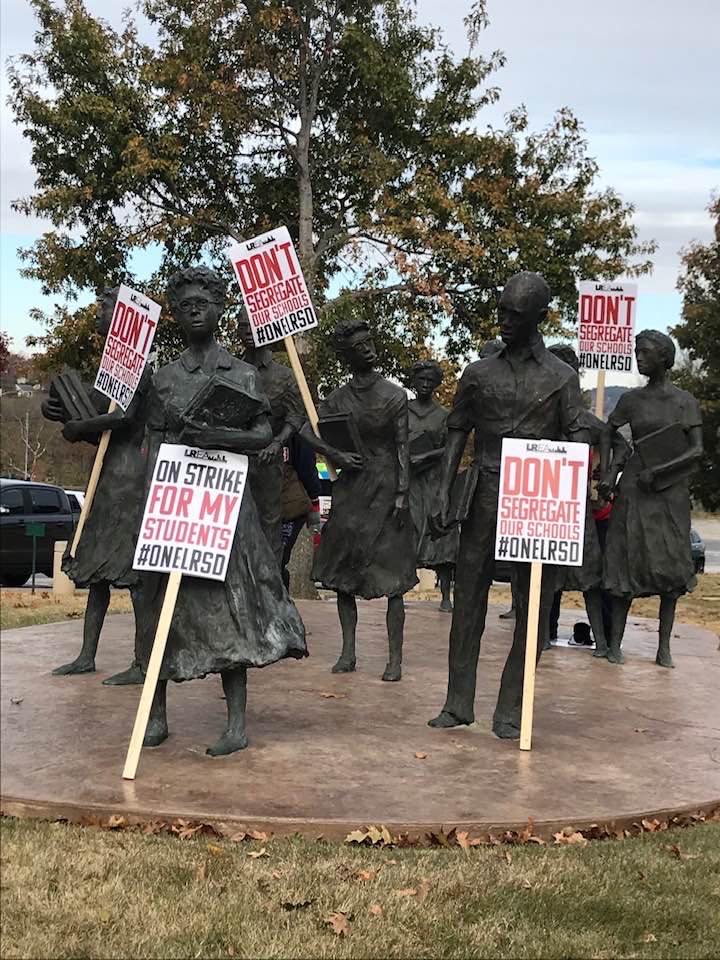Little Rock teachers strike for local control of school district

Striking teachers and their supporters protested this week on the steps of the Arkansas State Capitol. (Photo courtesy of Susana O'Daniel.)
Nearly 60 percent of Little Rock's public school students — more than 13,000 kids — weren't in the classroom on Nov. 14. Instead, many of them stood on the sidewalks outside in temperatures frigid for an Arkansas fall, joining hundreds of the district's teachers and educational support staff in a one-day strike protesting the state Board of Education's refusal to return their schools back to full, democratic local control. The strike was timed to coincide with a monthly state board meeting where the agenda included the plan for the district's future.
Back in 2015, the state board voted in a tense 5-4 split to take over control of the entire 48-school Little Rock School District from the local elected school board, citing a need to bring up to standards six schools considered to be in "academic distress" because fewer than half their students scored proficient or better on state exams over three years. The state board also voted to disband the then-recently elected local school board.
Many in the community, including the teachers' union, decried the decisions. Little Rock, which is 50 percent white and 42 percent black, though 60 percent of students in the district are black, is divided by I-630. North of the interstate, communities are wealthier, whiter, and schools are ranked higher by the state; south of the interstate, communities are poorer, blacker, and schools are ranked lower. All but one of the failing schools was on the south side. Community advocates say that if racial and economic inequality in the city doesn't improve, there's no way the state can expect gains in test scores that form the basis of its school assessments.
"Not only is democracy under attack, but innocent children are under attack," Anika Whitfield, a co-chair of Grassroots Arkansas, part of a coalition supporting a return to local control, told Facing South. "Their parents are no longer able to use their voices and their votes."
Last month, as the five-year maximum takeover period neared its end, the board released a list of failing schools showing that five of the six Little Rock schools that were failing at the time of the state takeover were still classified as failing. In that same period, the state authorized and re-authorized the district's several charter schools, which many parents and teachers have argued drain students and money from regular public schools. The proliferation of charter schools in Arkansas has largely come at the behest of the Walton family, the billionaire owners of Walmart, whose family foundation is the largest financial backer of charter schools in the state. Many of the people who have cycled on and off the state board since the takeover have connections to the Waltons and their foundation, which finances education reform efforts across the state and nation, and whose philanthropy is impossible to escape in a poor state.
The connections to Walton money set off alarm bells for public school advocates as soon as the takeover occurred. "There was this determination of the state and billionaires in our country to maintain separatism, to do it with such a disregard for democracy," Whitfield said. And with decision-making dominated by a state board that educators say doesn't make an effort to visit the district's struggling schools or take parent and teacher concerns seriously, many in the community view its actions as motivated by money and the prospect of continued Walton investment.
"To this day, in five years, they have yet to listen to what actual true educators have to say," Roy Vaughan, a journalism teacher at Little Rock Central High School and a union member, told Facing South. "Whereas with the school board, they have to listen to those educators. If not, they're accountable to the electorate."
Back in October, the Board of Education released a plan for reconstituting the district that relinquished state control only of the non-failing schools. The board then took a surprise vote to decertify the Little Rock Educational Association, the district's teachers' union, which was the only one in the state that still retained collective bargaining rights. In a city that still bears scars from the fight to integrate schools, the plan to put mostly white schools under local control and leave mostly black schools in the hands of the state reeked of resegregation, of separate and not equal.

"You may believe that we're throwing this word 'segregation' around as if it means nothing. But to this community, it has a visceral, guttural, historical meaning," teacher Jason Bailey of Parkview Magnet High School told the Board of Education at its monthly meeting on the day of the strike.
The anger has been mounting since October, when over 2,000 students across the district participated in a sick-out to back the teachers' union. About 100 of them went instead to Republican Gov. Asa Hutchinson's office to air their grievances with the state board's school control plan and decision to end union recognition. Though the board abandoned the initial plan to keep some schools under state control, the new draft plan gives the state board power to approve the district's superintendent, stipulates that the teachers' union not be recognized as a bargaining agent, and requires state Department of Education approval over the district's budget.
"We decided at that point we needed to take a stand for our kids," Teresa Knapp Gordon, president of the 1,800-member teachers' union, told Facing South. "Our members authorized us to do whatever was necessary up to and including a strike. At this point it's clear that they intend to resegregate our district and use our kids as pawns."
A strike for democracy
The Little Rock strike was unique among recent teachers' strikes in the South because it was not primarily seeking better pay or working conditions for teachers and staff. Instead, those on the picket line were focused on returning the district to full local control under an elected board of education. They received messages of solidarity from around the country, including from Democratic presidential candidates Bernie Sanders and Elizabeth Warren.
They didn't get what they wanted from the state board, however.
At the Nov. 14 meeting, board members heard hours of public comments on their draft plan for Little Rock schools. Most of the speakers accused the board of failing to listen to parents, to teachers, and to students. Outside the meeting room, protesters stood on the steps of the state capitol chanting "Hey hey! Ho ho! Johnny Key has got to go," referencing the former Republican state senator who Hutchinson appointed as state education commissioner in 2015.
Many speakers directly addressed Chairperson Diane Zook, whose nephew Gary Newton sits on the board of the Walton-funded Arkansas For Education Reform Foundation and whose husband, Randy Zook, is on the board of a Walton-funded charter school in the Arkansas Delta and serves as president and CEO of the Arkansas State Chamber of Commerce. Randy Zook and Newton are also the director and president, respectively, of Arkansas Learns, another Walton-connected nonprofit that bills itself as the "Voice of Business" in education and has been actively denigrating striking teachers and their supporters on social media.
Charles Zook — Diane Zook's stepson and Randy Zook's son — is a substitute teacher in the Little Rock district who has been vocally opposed to the state board's actions. He took to the microphone at the meeting to say that a separate system cannot be equal. "I feel like what's in front of me is a bunch of people with an agenda," he told the board. "I feel like you know what you're supposed to do, and you're pretty clumsy."
At the close of the overwhelmingly negative public comment period, Diane Zook motioned for the board to take a vote on another controversial component of its plan — adding two more seats to Little Rock's Community Advisory Board, a panel of representatives from around the city that advises the superintendent. Community members worry that's another opportunity for school privatization advocates to put their allies in positions of power. But Zook was shouted down by cries of "no taxation without representation" from the audience, which was packed with local control advocates wearing red.
In the face of the protests, Zook adjourned the meeting and said the board would reconvene the following day. When it met the morning of Friday, Nov. 15, the board decided to table discussion of the community advisory board and the plan to return the district to local control until its next meeting in December.
And parents, teachers, and students have no plans to stand down.
"This is the first battle in a longer fight," said Wendy Sheridan, a parent who joined the picket line yesterday. "And the parents and community are ready for it. We're ready to support our teachers and our kids. Most importantly, our kids."
This article has been updated to include information about the demographic breakdown of the Little Rock School District and to correct which school Jason Bailey teaches at.
Tags
Olivia Paschal
Olivia Paschal is the archives editor with Facing South and a doctoral student in history at the University of Virginia. She was a staff reporter with Facing South for two years and spearheaded Poultry and Pandemic, Facing South's year-long investigation into conditions for Southern poultry workers during the COVID-19 pandemic. Her reporting has appeared in The Atlantic, the Huffington Post, Southerly, Scalawag, the Arkansas Times, and Civil Eats, among other publications.
